Over Medicated, and Poisoned Pets
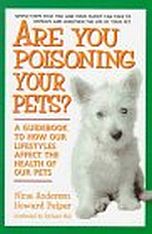 Pet pharmaceutical medication and flea and tick control are big business —
an estimated $3 billion world-wide, and Rimadyl, an anti-inflammatory
drug, is one of the bestsellers. It has been given to more than four
million dogs in the U.S. and more abroad, brought Pfizer Inc. tens of
millions of dollars in sales, and pleased many veterinarians and dog
owners. But the drug has also stirred a controversy, with other pet
owners complaining that nobody warned them of its risks.
Pet pharmaceutical medication and flea and tick control are big business —
an estimated $3 billion world-wide, and Rimadyl, an anti-inflammatory
drug, is one of the bestsellers. It has been given to more than four
million dogs in the U.S. and more abroad, brought Pfizer Inc. tens of
millions of dollars in sales, and pleased many veterinarians and dog
owners. But the drug has also stirred a controversy, with other pet
owners complaining that nobody warned them of its risks.
Flea control products such as powders, collars, and sprays labels may warn not to get these substances on your skin,
to wash your hands after applying them, and to keep them away from children, yet these chemicals are absorbed by your animal’s skin.
Each year, Americans also purchase and apply to their pets a vast array
of toxic chemicals intended to kill fleas and ticks.
These include collars, sprays, dusts, pet shampoos and more. Researchers at the UC-Davis
have evaluated the possible relationship between exposure to anti-flea/anti-tick pet
shampoos during pregnancy and risk for autism.
Rimadyl, Previcox and Other Pain Medicine Risk
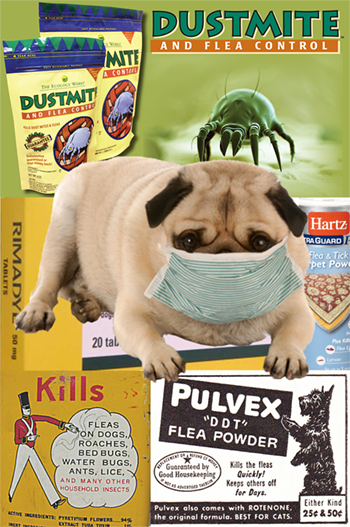 The FDA has released information concerning non-steroidal anti-inflammatory drugs (NSAID) for pets --
including Metacam, Deramaxx, Previcox and Rimadyl -- that shows they have been connected to
22,000 cases of illness in dogs, almost 3,000 of which were fatal.
The FDA has released information concerning non-steroidal anti-inflammatory drugs (NSAID) for pets --
including Metacam, Deramaxx, Previcox and Rimadyl -- that shows they have been connected to
22,000 cases of illness in dogs, almost 3,000 of which were fatal.
The best-selling drug known as Rimadyl,
for pets, has been found to be deadly for many animals, as witnessed
by the FDA receiving more than 6,000 bad reaction reports about the
drug manufactured by Pfizer. As a result, the FDA requested that Pfizer
advise consumers in their advertising that death was a possible side
effect. Pfizer refused and pulled their advertising, however they have
included "death" as a possible side effect on the drug label. Plans
call for a "Dear Doctor" letter to be issued to veterinarians and a
safety sheet will be attached to pill packages.
Pfizer acknowledges a problem with some dog owners, especially the
consumer group which mounted a campaign dubbed BARKS, for Be Aware of
Rimadyl's Known Side-effects (including loss of appetite, wobbling,
vomiting, seizures and severe liver malfunction). The drug company is
reported to be contacting pet owners who have told their stories on
the Internet, and is offering to pay medical and diagnostic expenses
for some dogs who may have been harmed by Rimadyl.
CLASS ACTION LAWSUIT AGAINST MAKERS OF RIMADYL Case No. 99-CP-25-353
Jean Townsend of Johns Island, South Carolina announced today that a
settlement has been reached with Pfizer, Inc. in what appears to be
the first lawsuit of its kind in this country – a lawsuit over injuries
that led to the death of Ms. Townsend's chocolate lab, George.
NSAIDs [non steroid anti inflammatory drugs]: widely given for pain,
arthritis, surgery, etc.:
- DERAMAXX: (deracoxib)
- ETOGESIC: (etodolac)
- METACAM: (meloxicam)
- RIMADYL: (carprofen)
- ZUBRIN (tepoxalin)
- NSAIDS/LAB TESTS
- ProHEART 6 (heart worm)
Chris Sweeney, who used to own a 9-year-old cocker spaniel named
Ari, said she never would have used the drugs if she had been aware
of the possible side effects. "I went from having a healthy dog to having
a dog that had to be rushed to the pet hospital and they said he might die
on the way," Sweeney said, adding that she believes Metacam is responsible
for Ari's death.
Boston veterinarian Dr. Margo Roman said she feels cases such as
Ari's are the tip of the iceberg. "There's liver issues, there can be
kidney issues, there can be gastrointestinal irritation issues," Roman
said, adding that she would never prescribe these NSAIDs to her patients
or use them on her own dog. Pet owners do not have to turn to potentially
harmful prescription drugs for their pets' health, however.
Natural options are available. Health advocate Mike Adams says that pet health,
like human health, mostly comes down proper nutrition, although
he noted a pet's nutrient and dietary needs were specific.
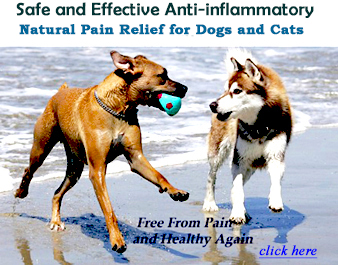
Non-steroidal, anti-inflammatory drug (NSAID) for pets
such as - Metacam, Deramaxx, Previcox and Rimady have caused 22,000 cases of illness in dogs, almost 3,000 of which were fatal!
Previcox is the veterinary version of the Vioxx (prescribed for arthritis in humans). Vioxx
was pulled off the market by the FDA after thousands of people ended up dead after
taking the drug. Yet, the same company continues to push Previcox which has the same risks and causes deaths in animals.
Natural, Safe Alternative to Dangerous Drugs
NuJoint formula with special nutrients to the joints and bones help control pain and inflammation caused by osteoarthritis,
joint abnormalities or soft-tissue surgery and provides effective natural pain relief for other symptoms.

Death after Heartworm Proheart 6 Shot
 ProHeart 6, a twice-a-year time-released heartworm medication used to treat
millions of dogs, was recalled at the request of the Food and Drug Administration
after thousands of animals suffered adverse reactions.
ProHeart 6, a twice-a-year time-released heartworm medication used to treat
millions of dogs, was recalled at the request of the Food and Drug Administration
after thousands of animals suffered adverse reactions.
The FDA received 5,552 reports of adverse reactions after dogs received heartworm shots.
- Myra lost a perfectly healthy 6 yr old Shih tzu after Proheart
6 shot (heartworm prevention). He started diarrhea and vomiting
within 5 days of the Proheart 6, and over weeks continued digestive
problems. Her dog died.
- Trouble received the ProHeart 6 shot on 8/20/02 in conjunction
with other vaccinations. He died on 10/17/02 (58 days) after the
shot. He was VERY healthy prior to the shot being given.
- Danny was a perfectly healthy five-year-old part Golden Retriever
mix who was energetic and happy. He died after receiving Proheart 6.
Manufacturer's Letter to Veterinarians Warns of Side Effects A letter
was sent to veterinarians by Fort Dodge, the manufacturer of ProHeart
6. Amongst other issues, you will see just some of the known side
effects of the medication.
Symptoms of Reactions:
- ProHeart
6 recall - Fort Dodge to Comply with FDA's Request to Recall
ProHeart 6 Injectable Heartworm Product from the Market Due to Serious
Health Concerns.
- Report An Adverse
Drug Experience - Veterinarians and animal owners are encouraged
to report adverse experiences and product failures to the government
Agency that regulates the product in question.
- FDA recalls popular heartworm drug for dogs
- WBZ's I-Team investigation found that in the past two and a half
years the FDA has received more than 4,000 reports of dogs getting
sick after getting a shot of ProHeart 6. And more than 400 dogs
have died nationwide.
Dr. Marlice Vonck DVM - "Healthy dogs with
a resistant immune system will usually be able to fight worm
infestation. Heartworm medication can cause severe adverse
reaction. For decades, the approach to maintaining healthy
animals was to wait for signs and symptoms of disease to occur
and to counter the challenge with an array of drugs which were
toxic for the disease causing agent. This approach is now being
questioned as the armada of drugs is diminishing due to multiple
drug resistant pathogens. Compounding this alarming trend is the
current approach to health maintenance which assumes that "all
is well" until actual disease processes begin. By this time,
the disease is established, sometimes irreversibly, and the damage
has occurred. So the questions arises...What if a new paradigm existed?
Could it be possible to optimize the immune status of animals so that (1)
disease is much less likely to occur and (2) if disease does occur, it's
severity and duration is minimized? The answer is YES and this paradigm
shift is being engineered by small, naturally occurring protein-like molecules
known to boost the immune system like no other"

When Veterinarians make Fatal Mistakes
When veterinarians make fatal mistakes, they face no real financial consequences.
The law hasn’t changed to reflect the attitudes of the average pet owner; courts still
treat pets as property. Damages paid to owners whose pets have been killed or injured
are so low that a typical medical malpractice insurance policy for a veterinarian costs
less than $20 a month. Damages are so low, in fact, that few pet owners can find a lawyer
willing to take even the most egregious case of veterinary malpractice.
"If the wellness plans make medicine into a standardized product, Banfield’s
pet drop-off policy is what allows a hospital to hum at maximum efficiency.
Pet owners are required to leave their dogs and cats all day when taking
advantage of the plan’s twice-yearly comprehensive exam. For some people
this is exactly why Banfield is so appealing—no more interrupting your
work schedule for a vet appointment. For Banfield it’s a way to squeeze
exams into the gaps between surgeries, walk-ins, and other appointments.
While pets wait for treatment, they’re warehoused in a wall of kennels
at the back of the hospital—sometimes without water, because animals
that drink need to urinate. Donna Smith, a licensed technician at a
Banfield facility in Waterbury, Conn., who was fired in 2014, says
staff at her hospital worked like a “pit crew,’’ with all the hurry
and commotion that connotes. But instead of changing tires and refilling
tanks, they were pulling dogs out of cages, giving vaccines, taking blood
and fecal samples, and rushing through physical exams that might take no
more than 90 seconds. “I once saw a doctor vaccinate the wrong dog because
we had paperwork everywhere and so many dogs lined up,” Smith says.
Veterinary Malpractice, Incompetence, Negligence
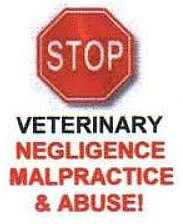 Veterinary Malpractice - "Of the tens of thousands of veterinarians
practicing in the United States, many are incompetent, careless or both.
Others fail to deliver adequate care because their singular focus on
profits makes them unwilling to pay for qualified employees, equipment,
supplies, etc. I have even known of one vet who diluted her euthanasia
drugs and another who re-used single-use surgery supplies. Unnecessary
deaths and suffering have become commonplace."
Veterinary Malpractice - "Of the tens of thousands of veterinarians
practicing in the United States, many are incompetent, careless or both.
Others fail to deliver adequate care because their singular focus on
profits makes them unwilling to pay for qualified employees, equipment,
supplies, etc. I have even known of one vet who diluted her euthanasia
drugs and another who re-used single-use surgery supplies. Unnecessary
deaths and suffering have become commonplace."
The Delaware News Journal reported that over the last few years
there has been a growing national trend to give animals more legal protection.
New legislation and lawsuits have been filed across the country on behalf
of animals. Several lawsuits against veterinarians aim to change laws
that treat pets as property and leave vets unaccountable for malpractice.
New York, Connecticut, New Jersey, and Rhode Island have considered
legislation granting pet owners the right to sue for pain and suffering
damages, including punitive damages for neglect or abuse. Tennessee
enacted such a law in 2000, and Illinois passed a version of it two years ago.
 Veterinary incompetence, negligence, and abuse are alive and well
in the United States and all over the world. Every day, untold numbers
of defenseless animals are left in the hands of some negligent, incompetent
doctors who inflict cruelty, injury, and death on our pets -- and get
away with it. Millions of people take their pets to vets every year.
Veterinary incompetence, negligence, and abuse are alive and well
in the United States and all over the world. Every day, untold numbers
of defenseless animals are left in the hands of some negligent, incompetent
doctors who inflict cruelty, injury, and death on our pets -- and get
away with it. Millions of people take their pets to vets every year.
Although skilled, competent veterinary care certainly outweighs the
incidences of negligence and abuse, the damage that those veterinarians
do is incalculable in terms of animal suffering, public health and safety,
consumer fraud, and the emotional devastation caused by knowing that
our beloved pets were harmed or destroyed by the very person entrusted
with their care.
If you believe that no veterinarian anywhere would
ever deliberately harm an animal...never abuse client or public trust...never
abuse their positions as doctors...or would never violate the laws of
their profession...you will learn that public record, disciplinary actions
by vet boards, and increasing media coverage on this ugly and disturbing
subject say otherwise. And if you think that it can't happen to you
and your pet...think again.
Unbearable Loss: The Traumatic Death of My Soulmate Dog Zoey:
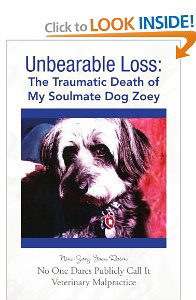 No One Dares Publicly Call It Veterinary Malpractice. I rescued my beloved dog Zoey from a high-volume killing pound. Bedraggled
and terrified, she was transformed into a handsome happy dog who danced
her life after she outgrew her fear and insecurity. We had nine years
together-not nearly enough. Zoey was diagnosed with cancer on October
9, 2001; thirteen days later, on October 23, 2001-a day I can never
forget-she was dead, but not from her illness. She developed all the
classic signs of chemo-induced sickness.
No One Dares Publicly Call It Veterinary Malpractice. I rescued my beloved dog Zoey from a high-volume killing pound. Bedraggled
and terrified, she was transformed into a handsome happy dog who danced
her life after she outgrew her fear and insecurity. We had nine years
together-not nearly enough. Zoey was diagnosed with cancer on October
9, 2001; thirteen days later, on October 23, 2001-a day I can never
forget-she was dead, but not from her illness. She developed all the
classic signs of chemo-induced sickness.
Distraught and confused, I
thought Zoey might be dying; a veterinarian who did not know Zoey destroyed
her without any veterinary care, assessment, or consideration of the
effects of chemotherapy. From rescue, through life and into illness
and death, and then my inconsolable grief, this is Zoey's story. My
journal of her days of illness, her final days, hours, and her death,
all are included here. I remember Zoey in
 Zoey poems
of remembrance and mourning and in photographs. I also provide a carefully
detailed exposé of what happened with the complaints
Zoey poems
of remembrance and mourning and in photographs. I also provide a carefully
detailed exposé of what happened with the complaints
I filed about veterinary
malpractice. I reproduce the complaint documents, my correspondences,
phone discussions, and the official response letters. The politics of
cover-up unfolds, revealing how impenetrable is the disregard for veterinary
misconduct. I offer advice and warning to others about how they might
best care for and protect beloved animals during their illnesses to
avoid the perils of the veterinarian's "license to kill." I offer my
thoughts about needed reforms to create objective and just review procedures.
List of Competent Holistic Veterinarians Holistic veterinary is attempting to make your pet as healthy
as he or she can be and gradually build up their body to the best that it can be.

EPA: Flea, tick products may injure, kill pets
Washington - March 24, 2010
The EPA agency reports that products intended to treat cats and
dogs for fleas and ticks kill hundreds of pets each year and injure tens
of thousands. At least 1,600 pet deaths related to Spot-On
treatments with
pyrethroids were reported to the EPA over the last five years,
according to an analysis of EPA pesticide incident exposure data by the center.
Pet owners take their pets to veterinarians to be dipped
in chemicals. Many consumers probably assume that the products they and their vets use have been subjected to rigorous testing, and must,
by virtue of their very ubiquity, be safe. After all, how could the government let deadly poisons be sold on grocery store shelves
without applying stringent standards? The EPA assigns risk levels to all pesticides for their potential
dangers to humans and some flea and tick products contain chemicals,
specifically permethrins, that are "likely to be carcinogenic to humans."
The agency will begin reviewing labels to determine which ones need to say more clearly how to use the products. The EPA's
effort follows increasing complaints from pet owners that the "spot-on" products have triggered reactions in dogs and cats,
ranging from skin irritation to neurological problems to deaths. Cats and small dogs appear particularly vulnerable, the EPA
said, especially when given products intended for larger animals.
Dr. Brandon Brooks, DVM - "Many (if not most) Over The Counter (OTC)
or non-prescription flea control products are very toxic to cats and
kittens- especially the ones only approved for use in dogs. Many people
mistakenly buy these for their pet (it's not always
their fault, the companies that make them want you to buy it, they don't really care
about the dangers involved) so it pays to be extra careful when buying
flea control products." Our animals are sicker than ever. Veterinarians
have never seen such an increase in the rate of liver disease, nervous
system disorders, cancers, diabetes, renal failure and other diseases.
Our animals are being routinely poisoned with pet food and pet medicine. Popular
anti-flea and anti-tick medications are extremely toxic to the liver.
According to Dr. Brooks, even though the cat or kitten does not have
the OTC flea control product directly applied to it, the cat or kitten
may still become ill through indirect exposure if it is applied to a dog
in the household, household furnishings, bedding, etc.. Also, many OTC
dog flea control products are not only toxic to cats, but dogs as well.
Hartz Fea and Tick Products
The principal ingredient in Hartz brand Flea and Tick products for
cats is a 40-year-old chemical pesticide called Phenothrin. Although long
since banned for use as a lawn pesticide, due its toxicity, Phenothrin
constitutes over 85% of the total ingredients in
 Hartz Advanced Care Plus
topical flea and tick drops for cats. The EPA has been reviewing pesticide
risks in pet products only since 1996, and because the agency is backlogged,
many pet products containing potentially harmful pesticides still make
their way onto store shelves.
Hartz Advanced Care Plus
topical flea and tick drops for cats. The EPA has been reviewing pesticide
risks in pet products only since 1996, and because the agency is backlogged,
many pet products containing potentially harmful pesticides still make
their way onto store shelves.
Despite multitudes of well-documented cases
of Hartz Flea and Tick Products causing injury and death to many innocent
pets, Hartz Mountain Corp. continues to deny any wrongdoing and insists
that its products are safe. Evidence against the safety of Hartz Flea and
Tick products continues to grow rapidly.
TV news channels have ran numerous
reports on the problem and a class action suit has been filed against Hartz
Mountain Corp. by the law firm of Faruqi and Faruqi, LLP and Squitieri
and Fearon, LLP. However, these deadly products are still being sold in
stores across the nation and remain well within the reach of unsuspecting
consumers who are unwittingly putting their beloved pets into harm's way.
The Poison Necklace
A Pesticide collar is nothing but a poison necklace around your pet's head. It emits a constant toxic cloud that
your pet inhales, and so do you, every time you hug your pet. What about
those insecticidal flea and tick shampoos and powders, sprays and dips?
Labels warn you not to get any on your skin, use rubber gloves and wash
your hands! Yet, they are rubbed into your pet's skin and then are licked
by your pet! Signs of pesticide overdose in your pet can include vomiting,
diarrhea, trembling, seizures and respiratory problems.
Toxic Flea Collars
The Cancer Prevention Coalition (CPC), which informs the public about
preventable exposures to carcinogens, list many brand-name products
as containing either carcinogens or neurotoxins, or both. Avoid flea
collars by Longlife, Hartz, Pet Agree, Sergeant;s and Zodiac. Flea and
tick dips, sprays, powders, foggers and bombs: click the headline and
scroll down the new page to learn more about how to control fleas without
resorting to chemicals.
Spot-On Flea and Tick Products Are Dangerous to Your Pets
Spot-On Pesticides such as Fontline, Zodiac, ProMeris,
Defend, Bio Spot, Adams and Advantage
trigger adverse reactions in dogs and cats, shorten life spans, cause
terminal illness, and premature death. . The active ingredients
in these solutions include chemicals such as imidacloprid, fipronil,
permethrin, methoprene, and pyriproxyfen, all of which have caused serious
health problems in animals in laboratories.
Even some of the inert
ingredients can be hazardous to your animal companion's health.
Other forms of flea control powders, collars, and sprays are no less dangerous
to you or your companion animals.
Labels may warn not to get these substances
on your skin, to wash your hands after applying it, and to keep it away
from children, yet these chemicals are absorbed by your animal's skin.
Immediate effects of pesticide overdose include vomiting, diarrhea,
trembling, seizures, and respiratory problems. If your dog or cat shows
any of these symptoms after the application of a pesticide, immediately
wash the product off and seek veterinary care.
Warning about ProMeris
 "I just wanted to add a warning about ProMeris. I applied it to my
2 1/2 year old Australian Shepherd this morning. Shortly after lunch,
I noticed she was staggering, barely able to walk at all. Her head was
hanging & she couldn't lift it up. She tried to look at me but couldn't
focus. I immediately called my Veterinarian. I was instructed to wash
her immediately and thoroughly with dish soap and then bring her to
their office. By the time we got there, she had improved greatly just
by removing the product. You could see the flaming red reaction to her
skin on the spot where it was applied. They gave her charcoal to fill
her tummy and stop any absorption in case she had scratched at the spot,
then licked her feet, and had ingested any of the product. I'm sure
that she didn't ingest any, but was willing to err on the side of caution.
The vet explained that there is a drug in it called amitraz that is
very potent and it was what she reacted to and that she would not use
ProMeris. She is now fine. After Googling ProMeris adverse reactions,
I feel very fortunate that she lived. Many others were not as fortunate.
Please post this so that maybe it can save even one unsuspecting pet
lover from going through this or worse" Joanne - Aledo, Tx
"I just wanted to add a warning about ProMeris. I applied it to my
2 1/2 year old Australian Shepherd this morning. Shortly after lunch,
I noticed she was staggering, barely able to walk at all. Her head was
hanging & she couldn't lift it up. She tried to look at me but couldn't
focus. I immediately called my Veterinarian. I was instructed to wash
her immediately and thoroughly with dish soap and then bring her to
their office. By the time we got there, she had improved greatly just
by removing the product. You could see the flaming red reaction to her
skin on the spot where it was applied. They gave her charcoal to fill
her tummy and stop any absorption in case she had scratched at the spot,
then licked her feet, and had ingested any of the product. I'm sure
that she didn't ingest any, but was willing to err on the side of caution.
The vet explained that there is a drug in it called amitraz that is
very potent and it was what she reacted to and that she would not use
ProMeris. She is now fine. After Googling ProMeris adverse reactions,
I feel very fortunate that she lived. Many others were not as fortunate.
Please post this so that maybe it can save even one unsuspecting pet
lover from going through this or worse" Joanne - Aledo, Tx
Safe Natural Organic Pest Control
 Juniperus Virginiana, a red cedar specie of cypress family plant, is an incredibly effective
natural insect repellent if formulated correctly.
It has been used for thousands of years to repel insects. When delivered
in small amounts the aroma will overwhelm most insects. The lingering aroma
of Juniperus Virginiana Oil is a pheromone
interruption agent that impairs the mental capacity of non-beneficial
insects, it has no effect on beneficial insects such as lady bugs, honey
bees, lizards, earth worms, butterflies, and toads. It is safe for
large and small animals, people and children.
Juniperus Virginiana, a red cedar specie of cypress family plant, is an incredibly effective
natural insect repellent if formulated correctly.
It has been used for thousands of years to repel insects. When delivered
in small amounts the aroma will overwhelm most insects. The lingering aroma
of Juniperus Virginiana Oil is a pheromone
interruption agent that impairs the mental capacity of non-beneficial
insects, it has no effect on beneficial insects such as lady bugs, honey
bees, lizards, earth worms, butterflies, and toads. It is safe for
large and small animals, people and children.
These cedar oil products were tested by Iowa State University at the request of the United States Department of
Agriculture for the use of the United States Army in Iraq to eliminate
the Desert Sand Flea problem that our troops are encountering, which chemical
treatments were either ineffective or causing rashes.
The test results were astonishing -this red cedar oil product was RATED
far superior to its chemical counterpart. These same products were
tested and proven to not only kill Mosquito's, Flea's & Bed Bugs, but
is one of the "ONLY KNOWN SUBSTANCES KNOWN TO MAN THAT WILL KILL THE FLEA,
ITS EGGS AND LARVEA THE FIRST TIME"
Studies found Cedar - Juniperus virginiana to be non-toxic.
A juniper (Juniperus sp.) oil-based phytomedicine was tested for nephrotoxicity
in Sprague-Dawley rats by oral administration of varying doses and was
found to be non-toxic. Article
from the Department of Biomedical Sciences, College of Veterinary Medicine, Oregon State University.

Artificial Sweeteners Deadly To Pets
Pet parents are unaware of the danger lurking in cookies, peanut butter, and other
food products with xylitol.
It is so deadly that within 30 minutes a dog can die
from insulin shock or liver failure. Krush Nutrition
peanut butters contain Xylitol, and the company responsibly offers a warning to dog owners on its website.
Vets Warn Owners To Keep Sugar-Free Away From Pets - AVMA - September 1, 2004
A sugar substitute found in a variety of sugar-free and dietetic cookies,
mints and chewing gum is proving highly toxic, even fatal, to snack-snatching
dogs. Xylitol, popular in Europe for decades but a relative newcomer
to the U.S. alternative-sweeteners market, can
 be "very, very serious"
to dogs when ingested, says Dana Farbman, spokeswoman for the Animal
Poison Control Center of the American Society for the Prevention of
Cruelty to Animals. "It doesn't take a whole lot (of xylitol), and the
effects are so rapid that the window of opportunity to treat the dog
is extremely small," Farbman says.
be "very, very serious"
to dogs when ingested, says Dana Farbman, spokeswoman for the Animal
Poison Control Center of the American Society for the Prevention of
Cruelty to Animals. "It doesn't take a whole lot (of xylitol), and the
effects are so rapid that the window of opportunity to treat the dog
is extremely small," Farbman says.
Sugar-free treats could be harmful to dogs - The American Society
for the Prevention of Cruelty to Animals' Animal Poison Control Center
is warning veterinarians, their staff, and pet owners that the xylitola
sweetener found in some sugar-free chewing gums, candies, and other
products can cause serious possibly life-threatening problems for dogs.
The American Society for the Prevention of Dogs ingesting large amounts
of products sweetened with xylitol may have a sudden drop in blood sugar,
resulting depression, loss of coordination, and seizures, according
to Dr. Eric K. Dunayer, a consulting veterinarian in clinical toxicology
for the poison control center.
The center is most concerned about products
in which xylitol is the primary ingredient. The American Society for
the Prevention of "These signs can develop quite rapidly, at times less
than 30 minutes after ingestion of the product," Dr. Dunayer said in
a statement. "Therefore, it is important that pet owners seek veterinary
treatment immediately." Some data suggest a link between xylitol ingestion
and liver failure in dogs, he said, though those data are insufficient
to draw firm conclusions. Dr. Dunayer published a case study on xylitol
toxicosis in April 2004 issue of the journal Veterinary and Human Toxicology.
Aspartame has a profound effect on mood, cognition, depressed mood, anxiety, dizziness,
panic attacks, nausea, irritability, and impairment of memory and concentration."
Dr. Janet Starr Hull - "The testing of sucralose reveals that
it can cause up to 40 percent shrinkage of the thymus: a gland that
is the very foundation of our immune system. Sucralose also causes swelling
of the liver and kidneys, and CALCIFICATION of the kidney. Note: if
you experience kidney pain, cramping, or an irritated bladder after
using sucralose in Splenda, stop use immediately."
Chocolate Toxic to Dogs?
Chocolate is toxic to dogs, specifically semisweet baking
chocolate, which contains much higher levels of caffeine and theobromine
(the principle alkaloid used in the synthesis of caffeine) than does
milk chocolate. That's not to say milk chocolate isn't dangerous. With
its high fat content, it can lead to pancreatitis in pets. Pure chocolate
contains theobromine and caffeine, which are both compounds called methylxanthines.
They are hazardous to pets, causing seizures in severe cases. According
to snopes.com, cocoa mulch has one of the highest concentrations
of theobromine found. It actually smells like chocolate, and is attractive
to dogs. Reportedly most dogs will not actually eat it though. Cats
are at lower risk mainly because they are even less likely to eat the
mulch than dogs.
One study in the Journal of the American Veterinary Medical Association
confirmed that a dog died due to ingestion of a substantial amount of
cocoa mulch. And in the Journal of Agricultural and Food Chemistry,
a scientist reports on the potential use of theobromine and caffeine
for "controlling" (that is, killing) pest coyotes. Coyotes being close
relatives to dogs, this should cause concern for anyone considering
using cocoa mulch in an area their pets have access to.
Pesticides in our animal's food
According to Consumer Reports, January 1998, there are 9,700 pesticides
in existence, and in 1995, U.S. farmers applied 566 million pounds of
pesticides to major fiber and food crops. Last summer, the U.S. Geological
Survey announced the first results of a massive study of pesticides
in 5,000 water samples from wells and rivers. Half the wells--and nearly
all streams--contained at least one pesticide."
Carolyn Swicegood has excellent articles on the adverse effect of pesticides on parrots and
the incredible health benefits of feeding organically grown food. While
she writes about parrot's sensitivity and susceptibility to being poisoned,
the information also applies to our dogs, cats, and any animal on earth,
including us, humans. Shirley

Cancer fighting nutrients become deadly when combined with chlorinated tap water
Some of nature's most valuable and essential anti-cancer and anti-disease
phytochemical nutrients which are commonly found in food have been discovered
to form deadly cancer causing substances when consumed or combined with
chlorinated tap water. This discovery includes familiar foods
including soy, fruits, vegetables, tea, many health products, and even
some vitamins. Research has proven that these essential nutrients are
the exact same families of compounds, that even in infinitesimal amounts
have been tormenting the water treatment and chlorine industries for
years.
Fluoride in Water: Wide Range of Serious Health Problems
"In 1990 a 10 year study was completed by the federal government National
Toxicology Program (a part of the Department of Health and Human Services)
to rule out any possibility that fluoride causes cancer. Much to their
surprise, bone tumors found in laboratory animals were found to be the
direct result of fluoride ingestion. Even before the study was complete,
the NTP contacted the Environmental Protection Agency to inform them
that fluoride was carcinogenic."
Water resonates with energy
Dr. Hidemitsu Hayashi, M.D. - " Water has the ability to attract
and accumulate bio-energy. It also stores an energy memory of harmful
or helpful vibrations to which it was exposed in the past. Chlorinated
tap water is polluted with non-biological chemicals and negative energy
imprints. It is also devoid of bio-energy and so may be regarded as
being badly polluted as well as 'dead'.
"Greenies" Danger!
Consumer Investigation exposes a potentially deadly problem involving
one of the most popular dog treats on the market. Millions of dogs chew
on the treats every day, and there's a good chance your pooch is one
of them. Consumer Investigator Wayne Havrelly discovered the danger.
These dog treats are called "Greenies." They're sold in stores everywhere.
Mike Eastwood and his wife, Jenny Reiff, filed a $5 million lawsuit
in New York, blaming Greenies for the intestinal blockage that caused
the death of their dog Burt. Burt did not die because he bit off a big
piece in his throat and choked, but because the treats are NOT 100%
digestable as they are advertised to be. They can swell in the intestine
and cause a blockage like the one that resulted in Burt's death. Supervising
a dog while they eat any greenie type treats is not an assurance of
safety.
"I just wanted to tell you about my "Greenie" experience. I have
a border collie, my pride and joy . In 2004 , Morgan ( my BC ), was
given a greenie...just one, And shortly after he had a pretty good seizure.
i just knew it was the treat, so I asked my vet, who said greenies did
not cause the seizure. A year later, I bought him one for Christmas,
this time he had six intense seizures, by the time they were over ,
he couldn't remember his name . Although I could not find anyone who
would admit a connection to Greenies then, now I am finding others who
have experienced the same thing. He has never seen a greenie since and
never had another seizure. After finding your web site, I thought you
may find this interesting. Bad Greenies!"
Few things bring more enjoyment to your dog than the reward of a
healthy and delicious treat.
Steroids are known to damage Kidneys.
"You take your dog to the vet with a skin infection. Your vet gives your
dog a steroid injection. The skin infection clears up. Later, you
discover your dog has kidney disease. Is there a clear connection between
the steroid injection and your dog's diseased kidneys? You don't know.
But we do know that steroids are known to damage kidneys. We also know,
from the drug manufacturers' own data sheets, that steroids can cause
liver damage, brittle bones, diabetes, adrenal insufficiency, an inability
to deal with stress, and damage to the immune system."Catherine O'Driscoll
Doctors tell you that steroids only cause side effects after many
years. But new research shows that permanent damage is immediate and
devastating. Studies show that steroids cause permanent, debilitating
effects after a single dosage. 'Steroids are probably the most sleazy
of modern day medications,' says John Mills, former professor of medicine
at the University of California, San Francisco and chief of infectious
diseases at San Francisco General Hospital. FAQ: Heartbreaking testimonial
of a cat on long term steroids --- Animals on Steroids: are there alternatives?
Are Antibiotics Making Your Pet Sick?
Diarrhea, abdominal pain, severe inflammation of the colon (colitis),
irritable bowel syndrome, skin problems, fever, elevated white blood
cell count, weak immune system, vomiting, dehydration, potassium deficiencies,
allergies, colon perforation, bad breath, excess stomach gas, yeast
problems, nutritional deficiencies and constipation are just some of
the many side effects and problems linked to antibiotics.
A growing number of veterinarians are recommending
immune enhancing substance to improve animal's health and
boost their immune system, including in cancer cases, toxic
conditions, diabetes, and neurological conditions. There are
amazing testimonials about
dogs, and cats recovering from cancer, diabetes and other severe degenerative
illnesses with a unique immune boosting formula.
Danger of rawhide and pig ears
Some veterinarians warn against feeding rawhide and pig ears because
they can contain chemical residues (from chemicals used to remove the
fur) that can be harmful to your dog;s health. Also, larger pieces can
break off and be swallowed, getting stuck in the intestines and causing
blockages. When the rawhide gets wet from the stomach juices, it swells
to twice its normal size causing serious stomach blockage. Soft and slick
rawhide can also become a choking hazard. Alternative to rawhide and pig ears:
premium chews,
training treats and baked goodies offer wholesome, healthy and delicious canine rewards.
No artificial flavors or colors. No corn, wheat or corn/wheat glutens.
PET HEALTH ALERT: BREAD DOUGH A NO-NO!
As the holidays descend upon us, there'll be many cooks in the kitchen--but
don't spoil your pet by giving him bread dough. According to Jill A.
Richardson, DVM, of the ASPCA Animal Poison Control Center (APCC), when
bread dough is ingested, an animal's body heat causes the dough to rise
in the stomach. As alcohol is produced during the rising process, the
dough expands. Pets who've eaten bread dough may experience abdominal
pain, bloat, vomiting, disorientation and depression.